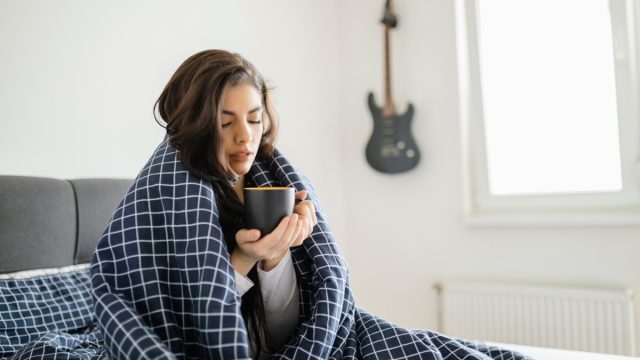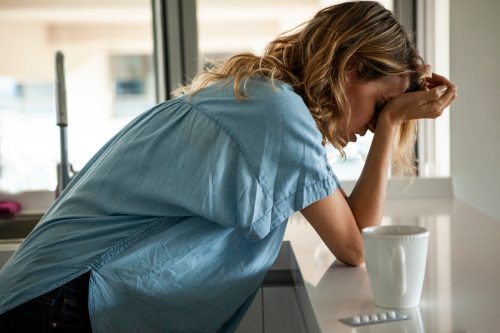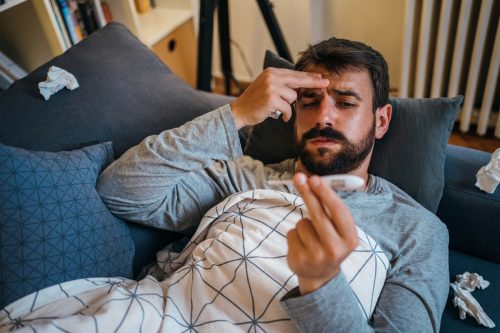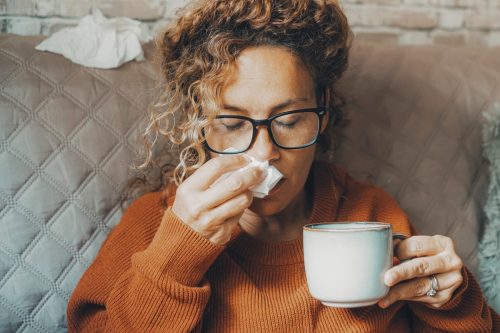Should You Drink Coffee When You're Sick? Doctors Weigh In
Here's what you need to consider when it comes to caffeine and your illness.

Some of us can't imagine going a day without our morning cup of coffee. But if you wake up sniffling with a sore throat, should you really still be indulging? While many say that a warm beverage can help alleviate the symptoms of a cold, there are some other factors about coffee you should consider before picking it as your sick day drink of choice. To help you determine if you can have that cup of joe, we talked to doctors to find out how it might affect your illness. Read on to find out what they recommend.
RELATED: 6 Bedtime Habits of People Who Never Get Sick.
Most people drink coffee at least once a day.

Back in July, market research company Drive Research published the findings of a survey they conducted among more than 1,500 people across the country to shed light on how coffee plays a role in our culture. According to the survey, 74 percent of Americans admitted to drinking coffee every day.
Even if they're not drinking it daily, 87 percent of the respondents said they do consider themselves at least somewhat obsessed with coffee.
"This suggests that coffee plays a central role in the lives of a large portion of the population, indicating its widespread popularity and cultural significance in American society," the researchers explained.
But what's especially interesting is that most people also believe drinking coffee is good for them. The survey found that 56 percent of Americans either strongly or somewhat agree that consuming coffee benefits their health.
What about drinking coffee if you're already sick, though?
RELATED: 30 Health Benefits Coming From Your Cup of Coffee.
Experts say coffee can worsen your symptoms.

Research has touted a number of health benefits associated with coffee. But if you're already feeling ill, it's important to remember that "coffee is a diuretic," Raj Dasgupta, MD, chief medical advisor for Sleepopolis, tells Best Life. In other words, caffeine increases the production of urine, which decreases the amount of fluid in your body, according to the Mayo Clinic.
"As a result, this beverage can dehydrate you and worsen symptoms when you're sick," Dasgupta further explains.
When you have a cold or the flu, you may experience symptoms such as sweating, vomiting, and diarrhea—all of which already exacerbate fluid loss, Mitchell Rosner, a nephrologist who focuses on fluid and electrolyte disorders, told The Washington Post.
Staying hydrated helps to replenish the fluids you lose while sick, and can help you from getting sicker or needing hospitalization. A lack of fluids can cause your blood pressure to drop and prevent blood from flowing to your heart and other vital organs, according to Rosner.
"When you're well-hydrated, my experience is that most patients feel better," he added.
It can have other health consequences.

You don't only need to worry about coffee's dehydration effects when you're sick, however.
"It can also irritate the lining of the stomach and exacerbate the symptoms of gastritis and acid-reflux," Dasgupta says.
Cameron Heinz, MD, board-certified internal medicine physician and health expert at Mobility Nest, warns that caffeine can elevate your heart rate and blood pressure, too, "which might not be ideal if you're already experiencing these symptoms due to your illness."
As it turns out, caffeine can even have a negative impact on the length of your illness, according to Dasgupta.
"The stimulant nature of caffeine may be counterproductive when you're dealing with a viral infection, since one of the things you really need to do is get good rest and sleep to help your body recover," he shares.
RELATED: 25 Ways to Boost Your Energy Without Coffee.
But coffee can be beneficial.

It's not all bad news for coffee-lovers, however.
"Coffee is rich in antioxidants, which can help combat oxidative stress in the body," Mo Janson, MD, general practitioner working with Welzo, tells Best Life.
Caffeine's stimulating effects can also be helpful if you have tasks or work you can't put off while sick, according to Janson.
"If you're feeling fatigued or groggy from the illness, a moderate amount of caffeine can help boost alertness and concentration," he notes.
And it's better to reach for a cup of joe while you're sick than something like an energy drink, which usually has "more caffeine than a cup of coffee" and doesn't contain the same antioxidants as coffee that can "boost the immune system and help to fight infections," according to Dasgupta.
Heinz says that there can even be negative effects from not drinking coffee during an illness for some people. "For instance, if you're used to having a daily cup of coffee and abruptly stop drinking it, you might experience withdrawal symptoms that could further exacerbate your sickness," he notes.
You may not need to give up coffee entirely when you're sick.

So while experts say you can drink coffee while sick, whether or not you should may "vary from person to person and depends on a few factors," Dasgupta says. These include the severity of your illness, caffeine tolerance, and the medications you're taking, according to the Sleepopolis medical advisor.
"If you have a mild cold, you may be able to tolerate coffee without any problems," he says. "However, if you have a more severe illness, such as the flu, coffee may dehydrate you and worsen your symptoms."
All in all, Heinz says the best course of action is to listen to your own body when you're sick.
"If you find that drinking coffee worsens your symptoms or makes you feel more unwell, it's best to avoid it altogether. On the other hand, if you can tolerate a small amount without experiencing any adverse effects, it might be okay to have a cup or two," he says. "It's just crucial to prioritize your overall well-being and comfort when deciding whether or not to consume coffee while sick."
For more wellness advice delivered straight to your inbox, sign up for our daily newsletter.
Best Life offers the most up-to-date information from top experts, new research, and health agencies, but our content is not meant to be a substitute for professional guidance. When it comes to the medication you're taking or any other health questions you have, always consult your healthcare provider directly.





















